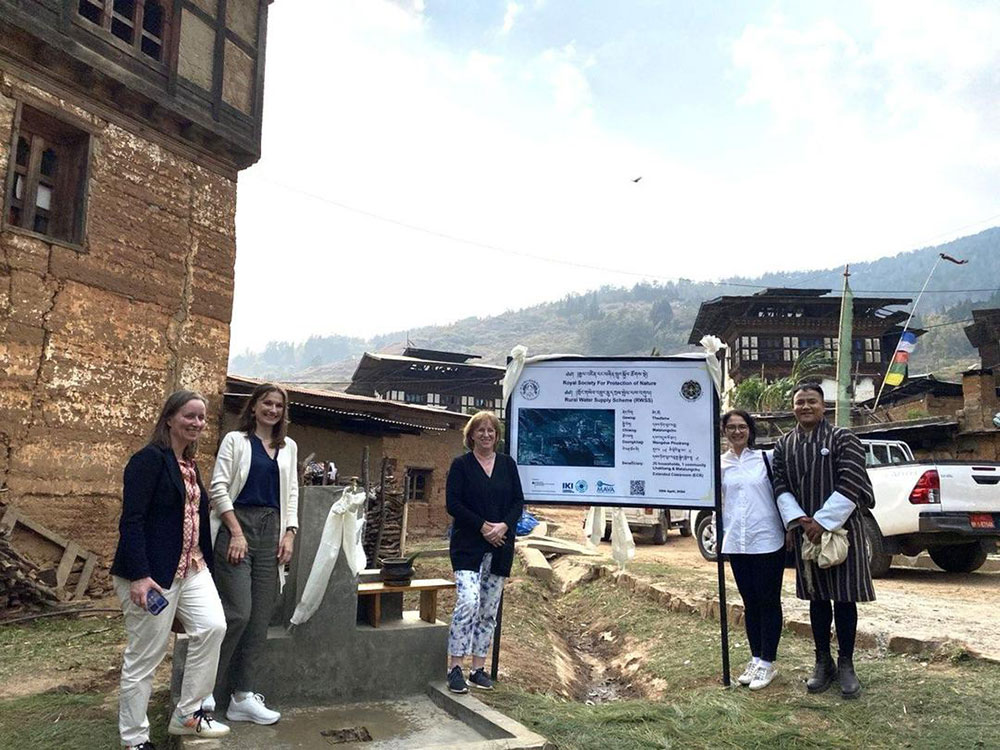Photo caption: The German delegation led by Dr Christiane Paulus, Director General (middle) inaugurates the completion of RWSS initiative on April 25
Chencho Dema
Matalungchu, Thedtsho, Wangdue:—For a decade, the village has faced water scarcity. This is now poised to change for the residents. In fact, the people of the village already enjoy a continuous supply of water at their doorstep. Every home boasts its own water tap.
In the past, three to four households had to share drinking water from one tape. Not anymore. There has not been water-conflict for sometime now. Rural water supply scheme (RWSS) has come to the village finally.
Royal Society for Protection of Nature (RSPN) is implementing a five-year project “Developing ecosystem-based solutions for managing biodiversity landscape in Bhutan” in partnership with the relevant government agencies.
The project is supported by the International Climate Initiative (IKI), Federal Ministry for the Environment, Nature Conservation Nuclear Safety and Consumer Protection (BMUV), German Government.
The project worth more than 4 M Euros is implemented across the WBH landscape of Punatshangchu and Mangduechu basin covering six districts (Punakha, Wangdue, Dagana, Trongsa, Tsirang, and Zhemgang).
The project has a total budget of Euro 4.2 Million. The project started in July, 2021 and will complete in June 2026.
The gewog administrative officer of Thedtsho, Sarita Gururng, said that the budget for the project was Nu 4 Million but only within Nu 2 Million the work could be achieved. This was because of the cost-sharing mechanism.
She said: “The implementation of the Matalungchu RWSS began in January and was to be completed in a span of five months but with the corporation from the residents, we managed to complete the project in three months on March 30.”
The remaining funds will be allocated for a similar project scheduled for implementation in Thango and Wongjukha villages.
The water source originates from Lingmukha in Punakha and is expected to help 25 households, totalling a population of 203 individuals, with 110 of them being women.
The village has 150 acres of arable land, predominantly used for cultivating paddy, a diverse range of vegetables, and mustard oil.
Thedtsho gup, Chador, said that with the water issue resolved, people would have the opportunity to cultivate crops for commercial purposes.
This is expected enable them to repay their loans more easily.
Benefits of RWSS
The RWSS project also benefits the only Matalungchu ECR, which accommodates to 25 students with Classes until III. This day-feeding school provides breakfast and lunch to students.
Sarita Gururng said that the principal of the ECR had to ferry water in his car along with his students.
The gup said that there is no more the fear of goongthong in the village.
Conservation of WBH habitats
Before the project was implemented in Matalungchu, residents resorted to pumping water from the Punatshangchhu, which disrupted the habitats of the critically endangered white-bellied herons.
“Now that the RWSS is completed, residents won’t be allowed to pump water from the river anymore. Individuals and businesses along the Punatshangchhu who currently pump water will also be prohibited from doing so,” said the gup. “This measure is crucial for safeguarding the habitat of the birds.”
The gup further said that the people were being educated about the importance of the bird. “People now understand the significance of the bird and are willing to do anything to protect the birds and its habitat.”
Tshogpa of the village, Namgay, said that thanks to the WBH the decade long issue of drinking water has been solved. “Now it is our turn to repay the birds by protecting them.”
The project officer for the Sustainable Livelihood Division (SLD) with RSPN, Karma Wangchuk, said that the objective of the project was to develop tools and approaches for protecting and conserving the endangered white-bellied heron and its habitat.


